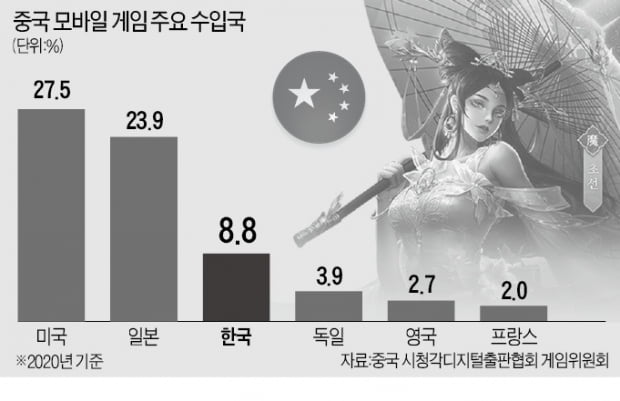Korea was found to be the’three largest consumer of Chinese mobile games’. This happened while the Chinese government enforced the’Hanhan Ryeong (Korean Wave Restriction Decree)’ based on the deployment of THAAD (high-altitude missile defense system) and blocked the distribution of new Korean games in the country. There is a growing voice that the government should actively step up and correct the irrational game trading environment.
![[단독] Blocking Korean games... China earned 2 trillion won](https://i0.wp.com/img.hankyung.com/photo/202012/AA.24807681.1.jpg?w=560&ssl=1)
○ Korean game market dominated by Chinese products
According to the game industry on the 23rd, the Game Committee (GPC) of the China Audiovisual Digital Publishing Association estimated that 8.8% of the total exports of Chinese mobile games this year came from Korea through the ‘2020 China Game Industry Report’. When looking at the share of mobile game exports by country that GPC first revealed this time, Korea was the third. The first place was the United States (27.5%) and the second place was Japan (23.9%). This is the first time that a report on market share has been released.
Chinese games are actually taking shape as a leading force in the domestic mobile game market. Seven of the top 30 sales (Google Play) are Chinese-made games. The money earned by Chinese game companies is estimated to be around 2 trillion won. Thanks to the robust mobile game exports, it is estimated that China’s total game exports this year recorded 15.4 billion dollars (16,9872 billion won), up 33.4% from a year ago.
The export performance of domestic mobile games to China is poor. According to Gevolution, a mobile app analysis site, among the top 30 mobile game sales in China (based on Apple App Store) on the 16th, only one Korean game was Nexon’s’Kartrider’ (23rd). It is analyzed that exports of new Korean mobile games to China have been blocked for the past three years. China has blocked the distribution of new Korean games in Korea since March 2017, taking issue with the deployment of THAAD in Korea.
More than 200 new Chinese mobile games were released to the Korean market during this period. On the other hand, there is only one domestic game allowed for service in China during the same period. On the 2nd, the Chinese government issued a panho to the mobile game’Summoners War: Arena in the Sky’ of the game company Com2uS on the 2nd. Panho is a license that must be issued to play game services in China. It has been 3 years and 10 months since the Korean game has been sold.
A game industry official said, “At one time, Korean games shook the Chinese market, and Chinese games were hard to find in Korea, but the situation was completely reversed.”
As exports to China, the world’s largest game market, were blocked, the global competitiveness of Korean games declined. According to the ‘2020 Korea Game White Paper’, recently released by the Korea Creative Content Agency, the ranking of the global market share of the Korean game industry fell from 4th in 2018 to 5th last year.
○ Government that neglects unfair trade
The domestic game industry is keenly keen on whether this license from China will lead to the cancellation of the Han-Great game. Major games of domestic game companies such as Netmarble, NCsoft, and Pearl Abyss are also expecting new services in China. However, weight is placed on the interpretation that it is premature to see it as a sign that the Han-Ryeong has been completely resolved. An official in the game industry said, “The popular games of large domestic game companies that will have a greater impact on the Chinese game market than’Summoners War’ have not yet given a plate.” This edition was given in order to escape criticism that China continues to protect its own game market and prevents the export of Korean games, and it can only be a one-off.
There is also a growing voice of criticism that the government is passive in solving the situation. In the parliamentary audit last October, Minister Park Yang-woo of the Ministry of Culture, Sports and Tourism, the main department of the game industry, said, “We made a separate request at the meeting of the Ministers of Culture, China, Japan, and will comprehensively review the World Trade Organization (WTO) complaint.” However, no action has been taken since. Unlike China’s licensing system, in Korea, foreign game companies can freely launch services.
Reporter Kim Joo-wan [email protected]
Ⓒ Hankyung.com prohibits unauthorized reproduction and redistribution
